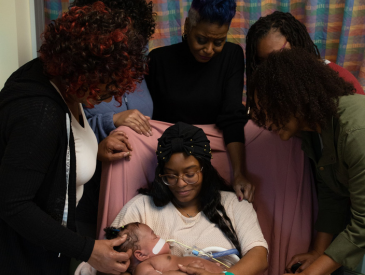Extended Family and Friends
The emotional, practical, and logistical challenges of caring for your child can be challenging for those who love and care for you. Some parents prefer to have their family and friends involved in the intimate details of their journey with their child. Others prefer to be supported from afar. And sometimes it is a mix of the two, depending on circumstances and individual relationships. Your preference is very personal, and it is helpful to communicate it.

Your Team:
A member of the clergy who is responsible for the religious needs of an organization and/or its constituents.
A specialist whose aim is to improve the quality of life of their patients over the course of their illness regardless of stage, by relieving pain and other symptoms of that illness.
A mental health professional who uses therapy and other strategies to support coping and adjustment and treat concerns regarding social, emotional, or behavioral functioning.
A trained professional who works with people, groups and communities to help them better their lives.
An individual who leads and/or guides individuals or groups coping with life experience and challenges.
A psychologist, social worker, palliative care clinician, chaplain and/or spiritual leader can provide a space for talking through emotions that may arise for you and other family members. They can also help you explain challenges to your extended family and community. A trusted friend or close family member can act as your communication hub, helping to keep others informed.
The reality is that you may need to be specific and direct in stating what you need. Some families find that the Ring Theory of Support is a helpful framework for establishing roles on your support team. As everyone understands their roles, it will be clear that you and your co-parent, if there is one, know what is best for your child and family, and are making decisions in their (and your) best interest.
Consider that different members of your support circle can have different roles. For example, you may need help with practical things like grocery shopping, cleaning or even laundry. If you have other children you might ask for play dates, or transportation to and from school, or adult friends to attend school or community events when you cannot. You also may want to consider adopting an online resource that allows you to specify your needs and others to volunteer and schedule assistance. Having a family member or close friend act as a communication hub can be helpful, and in most instances, this person will be so glad you asked. And, of course, there are the people you want to rely on when you need emotional support.
Communicating about roles can be awkward. However you choose to share your journey and whatever the roles you assign, well-intended loved ones may have other ideas. They may want to take on different tasks, or share their thoughts and feelings with you. Your extended family and friends may have strong opinions and/or beliefs that align with, or contradict, your own. You may consider this an extra burden. As you make decisions, you may choose to consider their input or not.
You may find over time that your community circles change. People you thought would support you may not, or they may draw close initially and then drift away over time. They may not know what to do, be scared to say the wrong thing, feel helpless or overwhelmed by their own emotions, or not want to intrude. Whatever the reason, this can be very painful. At the same time, other people (some unexpected) may show up in the most helpful ways, strengthening your bond. Forming connections with other parents of children with serious medical conditions can also feel very validating and supportive.
– Caryn, parent of Robby
Related Resources
-
 Extended Family: It’s been a lifeline to have each other.video
Extended Family: It’s been a lifeline to have each other.video -
 It’s What They Didn’t Do that MatteredBLOG
It’s What They Didn’t Do that MatteredBLOG -
 My mother: "The biggest support she gave me was tracking me from afar."video
My mother: "The biggest support she gave me was tracking me from afar."video -
 The Ring Theory of Support: Asking for Support and Offering It to Othersguide
The Ring Theory of Support: Asking for Support and Offering It to Othersguide -
 Being a grandparent during the tough timesBLOG
Being a grandparent during the tough timesBLOG -
 Grandparents / Extended Familyvideo-collection
Grandparents / Extended Familyvideo-collection -
 For Grandparents and Extended Family of Children with Serious Illnessguide
For Grandparents and Extended Family of Children with Serious Illnessguide -
 I spoiled my granddaughter.video
I spoiled my granddaughter.video